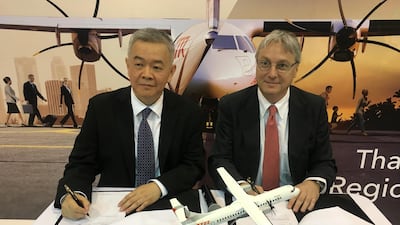ATR, the maker of turboprop aircraft, won a $100 million aircraft order from Bangkok Airways, the first plane deal announced at the ongoing Singapore Airshow.
The contract is for four additional ATR 72-600s, according to a statement distributed after Bangkok Airways signed the deal in Singapore. The airline, which operates a fleet of 15 ATR planes, is also considering placing an order for more than 20 narrowbody planes possibly this year to replace some of its Airbus jets, said chief financial officer Anawat Leelawatwatana, who signed the deal with ATR's chief executive Christian Scherer.
The Singapore airshow was devoid of any plane orders on the first day Tuesday. Plane makers Airbus and Boeing typically use airshows in Farnborough, Paris or Dubai to announce several large contracts they win from airlines. according to Bloomberg.
Last year the Indian budget carrier Indigo placed an order for 50 ATR 6oo aircraft for a reported $1.3 billion.
The latest ATR deal comes as European Nato buyers of the Airbus A400M military transporter are finalising an agreement to negotiate a new delivery schedule and contract terms for the troubled aircraft programme, sources familiar with the discussions told Reuters.
The A400M - ordered by Belgium, Britain, France, Germany, Luxembourg, Spain and Turkey - has been hit by engine gearbox problems and delays in fitting parachuting capacity and advanced defences.
Airbus officials presenting the aircraft at the Singapore Airshow declined to comment.
Airbus has been urging the seven nations to cap its exposure to fines and payment delays triggered by technical delays on the programme. The company was keen to reach a deal before it reports earnings on February 15.
Airbus last year cited "huge losses" on the project and warned of "significant risks" ahead. The programme was initially valued at €20bn (Dh90.71bn) but its cost has ballooned to well over €30bn, sources told Reuters last year.
Nato buyers agreed in principle to revamp the delivery schedule and requirements for the plane during a meeting in London on Monday.
Airbus must still work out the exact terms and conditions with each of the individual buyers, one of the sources said.
_______________
Read more:
Airbus defence unit freezes spending amid cash crisis
Airbus left red-faced as failure of new military plane strands defence chief
_______________
Britain's defence ministry was expected to announce the agreement later on Wednesday, a source said. The ministry of defence declined comment.
The countries acknowledged during the meeting that the programme's problems were caused in part by fresh demands imposed by the buyer nations.
Occar, the pan-European procurement agency, also declined comment on the outcome a Monday meeting.
Also at the air show, the top US diplomat overseeing arms sales said Wednesday she sees keen interest in American weaponry in Asia, where China's military footprint and political influence are surging.
Ambassador Tina Kaidanow was leading a large US delegation to the Singapore aviaition event, the largest in the region, and urging South East Asian governments to purchase US-made arms like the F-35 fighter jet.
Two F-35B fighter jets, belonging to the US marine corps and made by Lockheed Martin, made their debut Tuesday at the air show. The jets can take off from a short runway and land vertically.
"It's been great, really great. A lot of interest in the region and in doing business here," Ms Kaidanow told AP.
"We've seen a number of companies, small and large, and I want to encourage them both," she said.
Apart from supporting American jobs, the US intends to help its regional partners beef up their security, she said.
The Trump administration in December outlined a new security strategy that emphasises countering China's rise and reinforcing the US presence in the Indo-Pacific region, where Beijing and Washington accused each other of stoking a dangerous military build-up.
More than 170 American companies were exhibiting at the Singapore show, using close to a third of the exhibition space according to a release from the US Embassy. The show features over a 1,000 participating companies from 48 countries.
______________
Read more:
Lockheed Martin signs $1.6bn UAE deal amid Arabian Gulf tensions
US approves $15 billion missile sale to Saudi Arabia
______________
Among US weaponry on display were F-16C fighter jets, the US navy's P-8 Poseidon maritime patrol aircraft and an F/A-18 Super Hornet, a fighter aircraft made by Boeing.
The Singapore show's commercial dealings period ends Friday. Then it will open to the public.
Analysts said that large aircraft orders are unlikely, given the current backlogs of leading manufacturers.
Airbus has a backlog of over 2,000 planes in the Asia-Pacific region alone. Chicago-based Boeing has a total backlog of 5,864 planes.
"The combination of large orders already placed by Asian airlines in recent years, combined with large order backlogs mean that Asia-Pacific airlines wishing to place new orders face long waiting times for new deliveries," said Rajiv Biswas, the Asia-Pacific Chief Economist at IHS Markit.
Washington has been wooing countries like Vietnam, a former foe, with arms sales and transfers at a time when China has reinforced its territorial claims in the South China Sea with extensive construction projects on man-made islands.
Ms Kaidanow said earlier she planned to meet with officials from Japan, Canada and several South East Asian countries to discuss arms purchases at the trade show. Southeast Asian countries should consider purchasing US arms "not just as a matter of security but also regional balance," she said.
One industry executive said the agreement would provide some relief for Airbus and its suppliers after years of mounting tension between buyer nations and the companies.

